Filter by
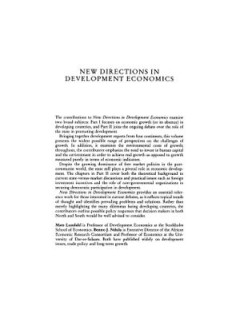
New Directions in Development Economics
New Directions in Development Economics is divided into two parts. The first half considers the dilemna of growth with special reference to its environmental cost. The second half focuses on the role of the state in the context of the growing dominance of the free market argument. The contributors include Paul Collier, Partha Dasgupta, Ronald Findlay and Deepak Lal.
- Edition
- -
- ISBN/ISSN
- -
- Collation
- -
- Series Title
- -
- Call Number
- 650
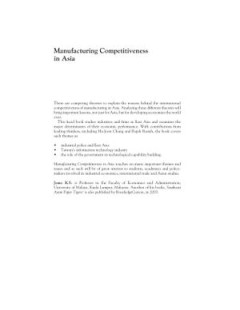
Manufacturing Competitiveness in Asia
There are competing theories to explain the reasons behind the international competitiveness of manufacturing in Asia. Analysing these different theories will bring important lessons, not just for Asia, but for developing economies the world over. This lucid book studies industries and firms in East Asia and examines the major determinants of their economic performance. With contributions from …
- Edition
- -
- ISBN/ISSN
- -
- Collation
- -
- Series Title
- -
- Call Number
- 650
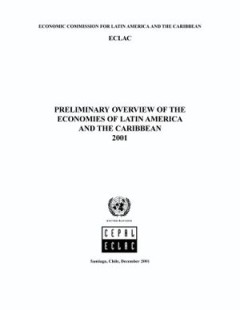
Preliminary Overview of the Economies of Latin America and the Caribbean 2001
The severe slowdown in the world economy in 2001 cut short the recovery that had begun in 2000 and dashed hopes that Latin America and the Caribbean were about to embark upon a new growth cycle. Unlike the crises of the 1990s, which were confined to a limited group of countries, the slowdown of 2001 engulfed the region as a whole. The impact of the adverse international environment impinged upo…
- Edition
- -
- ISBN/ISSN
- -
- Collation
- -
- Series Title
- -
- Call Number
- 650
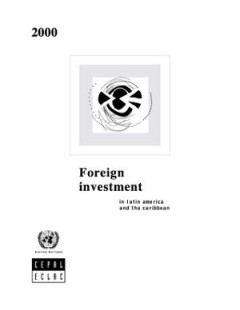
Foreign Investment in Latin America and the Caribbean 2000
This study seeks to provide greater insight into foreign direct investment (FDI) in Latin America and the Caribbean. A corporate strategy-based analytical framework has been used to interpret the copious yet heterogeneous information available on the subject. The research programme employed by the Unit on Investment and Corporate Strategies is structured around the examination of specific situa…
- Edition
- -
- ISBN/ISSN
- 9789213633656
- Collation
- -
- Series Title
- -
- Call Number
- 650
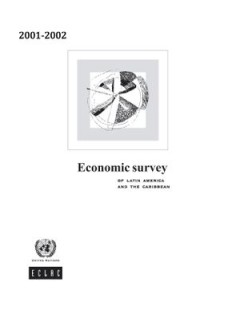
Economic Survey of Latin America and the Caribbean 2001-2002
The present edition of the Economic Survey of Latin America and the Caribbean, annual publication that appears every year since 1948, consists of three parts and one statistical appendix. The first part of the Survey covers the main aspects of the regional economy from a sectorial and thematic perspective. Chapter 1 deals with the situation of the first half of 2002 and the prospects for the ye…
- Edition
- -
- ISBN/ISSN
- 9789211558388
- Collation
- -
- Series Title
- -
- Call Number
- 650
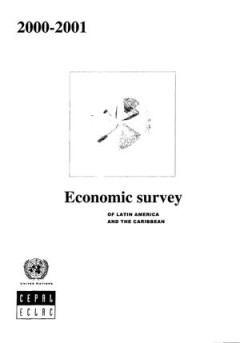
Economic Survey of Latin America and the Caribbean 2000-2001
This is the fifty-third edition in this series. The first part of the Survey covers the regional economy. It begins with a chapter dealing with the situation in the first half of 2001 and the prospects for the year as a whole. This was previously published separately with the title 2001: Current Conditions and Outlook. The analysis of the various aspects of the regional economy in 2000 consists…
- Edition
- -
- ISBN/ISSN
- -
- Collation
- -
- Series Title
- -
- Call Number
- 650
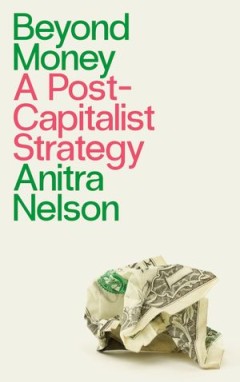
Beyond Money : A Postcapitalist Strategy
A fascinating portal into arguments about why we need to get beyond money' - Harry Cleaver What would a world without money look like? This book is a lively thought experiment that deepens our understanding of how money is the driver of political power, environmental destruction and social inequality today, arguing that it has to be abolished rather than repurposed to achieve a postcapitalis…
- Edition
- -
- ISBN/ISSN
- 9781786807809
- Collation
- -
- Series Title
- -
- Call Number
- -
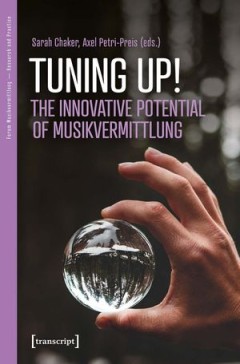
Tuning up! The Innovative Potential of Musikvermittlung
Professional musicians who perform in hospitals, retirement homes and prisons, creatively stimulated by the residents; babies crawling over exercise mats, enjoying classical music together with their parents; concert-goers who take their seats between the musicians in order to experience music up close with all their senses - the opportunities to make and experience music are almost unlimited. …
- Edition
- -
- ISBN/ISSN
- 9783839456811
- Collation
- -
- Series Title
- -
- Call Number
- 780
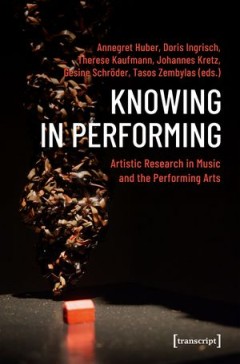
Knowing in Performing: Artistic Research in Music and the Performing Arts
How can performing be transformed into cognition? Knowing in Performing describes dynamic processes of artistic knowledge production in music and the performing arts. Knowing refers to how processual, embodied, and tacit knowledge can be developed from performative practices in music, dance, theatre, and film. By exploring the field of artistic research as a constantly transforming space for pa…
- Edition
- -
- ISBN/ISSN
- 9783839452875
- Collation
- -
- Series Title
- -
- Call Number
- 780
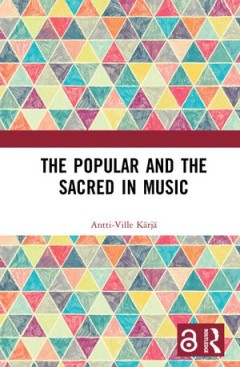
The Popular and the Sacred in Music
Music, as the form of art whose name derives from ancient myths, is often thought of as pure symbolic expression and associated with transcendence. Music is also a universal phenomenon and thus a profound marker of humanity. These features make music a sphere of activity where sacred and popular qualities intersect and amalgamate. In an era characterised by postsecular and postcolonial processe…
- Edition
- -
- ISBN/ISSN
- 9781000509465
- Collation
- -
- Series Title
- -
- Call Number
- 780
 Computer Science, Information & General Works
Computer Science, Information & General Works  Philosophy & Psychology
Philosophy & Psychology  Religion
Religion  Social Sciences
Social Sciences  Language
Language  Pure Science
Pure Science  Applied Sciences
Applied Sciences  Art & Recreation
Art & Recreation  Literature
Literature  History & Geography
History & Geography